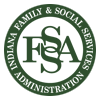The Centers for Medicaid & Medicaid Services (CMS) has notified the Indiana Family and Social Services Administration that it has approved the agency’s proposed waivers and amendments for launching the Indiana PathWays for Aging program and continuing to provide home and community-based services to eligible Hoosiers across a number of programs, including PathWays, starting July 1, 2024.
The approved waivers include the following 1915(c) home and community-based services waivers: Community Integration and Habilitation Waiver, the Family Supports Waiver, the Health and Wellness Waiver, the Indiana PathWays for Aging Waiver and the Traumatic Brain Injury Waiver. Additionally, CMS has approved via a 1915(b) waiver the transition to managed care for Indiana’s long-term services and supports program under the Indiana PathWays for Aging program.
The approved waivers can be found HERE. The approval comes after two public comment periods in 2023 and early 2024.
The PathWays Waiver is a new waiver, replacing the Aged and Disabled Waiver for individuals aged 60 and over and will be administered by the Office of Medicaid Policy and Planning. The Health and Wellness Waiver is the former Aged and Disabled Waiver. It now serves individuals under age 60 and will be administered by the Division of Disability and Rehabilitative Services (DDRS). The Traumatic Brain Injury Waiver is also moving from FSSA’s Division of Aging to DDRS.
The new PathWays Waiver has been approved for five years. The other amended waivers remain on their current CMS-approved timelines.
Some noteworthy changes in the newly approved PathWays, H&W, and TBI home and community-based services waivers include:
- Adjustments to Structured Family Caregiving including clarifying when an eligible individual can receive skilled respite, permitting foster parents to provide Structured Family Caregiving services, and clarifying how individuals are assigned a tier.
- Settings in which individuals can receive home and community-based services was clarified.
- Alignment of expectations, requirements, and service limitations across all waivers.





